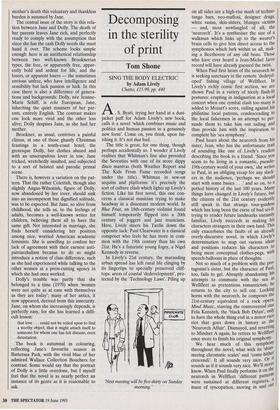Small but perfectly formed
Frank Kermode
A FAMILY ROMANCE by Anita Brookner Cape, f14.99, pp. 224 Priority in the use of this title could be claimed by Richard Wollheim, who, in 1969, gave it to an ingenious novel, which also made stronger reference than this one to the original sense of the term. However, Anita Brookner does establish a Freudian association by situating some of her charac- ters in Maresfield Gardens; they have Viennese connections and there is signifi- cant mention of an address in the Berggasse. Not for the first time she offers us samples of middle-European bourgeois life comfortably transported to London. But the heroine and her family, more English in their manners, live in Prince of Wales Drive, a middle-class bastion regard- ed as inaccessibly far to the south, and lacking (so far as I know, and I once lived there) any obvious Freudian associations.
This, Miss Brookner's 12th novel, is a sharp, fastidious and finally impressive rehandling of a now familiar theme. Its narrator is a girl, Jane, with `no beauty to speak of(I was lacking in charm, of course') and the principal character is a woman known as Dolly, a name which always vaguely suggests raffishness or fecklessness. These characters are richly Specified, and we are offered ample Information about their families. We know about Jane's Jewish grandmother in Mares- field Gardens, and about her mother (whom she resembles in her patience and lack of obvious dash and glitter), her placid banker father, and her uncle, who married
Dolly,
We are similarly well informed on Dolly's antecedents: her mother, a divorced refugee, the soup always simmering on the stove, turned herself into a surprisingly successful Parisian couturier. As a child DoIlY made louche, jolly childhood friend- ships with the neighbourhood whores, and as a girl danced with American officers at the Crillon. Widowed, she assumes that the World, or rather Jane's mother, her sister- la-law, owes her a living, which she demands almost with contempt, and even with resentment; for money she might have had, and obviously needed more than they, should not have gone to the mousy inhabi- tants of Prince of Wales Drive. After her mother's death this voluntary and thankless burden is assumed by Jane.
The central issue of the story is this rela- tion between Jane and Dolly. The death of her parents leaves Jane rich, and perfectly ready to comply with the assumption that since she has the cash Dolly needs she must hand it over. The scheme looks simple enough: here is an antithetical relationship between two well-known Brooknerian types, the free, or apparently free, appar- ently bold and ardent for life, and the losers, or apparent losers — the sometimes envious unfree, who have intelligence and sensibility but lack passion or luck. In this case there is also a difference of genera- tions and backgrounds: Dolly, née Jeanne- Marie Schiff, is echt European, Jane, inheriting the quiet manners of her par- ents, entirely English. The contrast makes one look more vivid and the other less alive; Dolly despises Jane, as she had her mother.
Brookner, as usual, contrives a painful climax, at one of those ghastly Christmas feastings in a south-coast hotel; the grotesque Dolly, her clothes absurd and with an unscrupulous lover in tow; Jane tricked, wretchedly insulted, and subjected to a sort of belated and parodic primal scene.
There is, however a variation on the pat- tern. That the rather Colettish, though also slightly Angus-Wilsonish, figure of Dolly, now abandoned by her lover, should sink into an incompetent but dignified solitude, was to be expected. But Jane, so alive from childhood, she tells us, to the feelings of adults, becomes a well-known writer for children, believing them all to have the same gift. Not interested in marriage, she finds herself considering her position among nice, worried American academic feminists. She is unwilling to confess her lack of agreement with their earnest anti- patriarchalism because to do so might introduce a notion of class difference, such as she had experienced while talking to the other women at a press-cutting agency in which she had once worked.
Dolly's trouble was partly that she belonged to a time (1970) when 'women were not quite as at ease with themselves as they are today'; many of her antics, it now appeared, derived from this insecurity. Jane, on whom she increasingly depends, is perfectly easy, for she has learned a diffi- cult lesson:
that love . . . could not be relied upon to find a worthy object, that it might attach itself to someone for whom one has felt distaste, even detestation.
The book is autumnal in colouring, reflecting Jane's favourite season in Battersea Park, with the vivid blue of her admired Wallace Collection Bouchers for contrast. Some would say that the portrait of Dolly is a little overdone, but I myself feel that the novel is as nearly perfect an instance of its genre as it is reasonable to ask.



















































 Previous page
Previous page